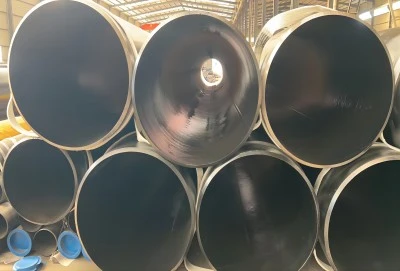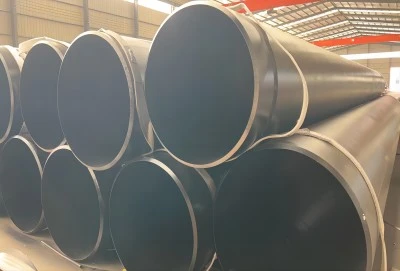In the ever-evolving landscape of the chemical industry, the choice of piping materials plays a crucial role in ensuring safety, efficiency, and longevity of processing plants. High Frequency Welded (HFW) pipes have emerged as a popular choice for various applications within this sector. This article delves into the properties, performance, and benefits of HFW pipes in chemical industry applications, focusing on their corrosion resistance, performance in aggressive environments, and key advantages for chemical processing plants.
|
|
|
What Are the Corrosion-Resistant Properties of HFW Pipes in the Chemical Industry?
High Frequency Welded pipes are known for their excellent corrosion-resistant properties, making them ideal for use in the chemical industry where exposure to corrosive substances is a constant concern. The corrosion resistance of HFW pipes stems from several factors:
1. Material Selection: HFW pipes can be manufactured using various corrosion-resistant materials such as stainless steel, duplex stainless steel, and nickel alloys. These materials inherently possess high resistance to corrosion, which is further enhanced by the HFW process.
2. Uniform Microstructure: The high-frequency welding process creates a uniform microstructure along the weld seam, which is crucial for maintaining consistent corrosion resistance throughout the pipe. This uniformity minimizes the risk of localized corrosion that can occur in pipes with inconsistent material properties.
3. Smooth Surface Finish: HFW pipes typically have a smoother surface finish compared to other welding methods. This smooth surface reduces the potential for corrosion initiation points and makes the pipes easier to clean and maintain.
4. Heat-Affected Zone (HAZ) Control: The HFW process allows for precise control of the heat-affected zone, resulting in a narrow and consistent HAZ. This controlled HAZ helps maintain the corrosion-resistant properties of the base material, reducing the risk of preferential corrosion in the welded area.
5. Post-Weld Heat Treatment: When necessary, HFW pipes can undergo post-weld heat treatment to further enhance their corrosion resistance. This process helps to relieve residual stresses and optimize the microstructure for improved corrosion performance.
The combination of these factors contributes to the superior corrosion resistance of HFW pipes, making them suitable for handling a wide range of corrosive chemicals in industrial applications.
How Do High Frequency Welded Pipes Perform in Aggressive Chemical Environments?
High Frequency Welded pipes have demonstrated exceptional performance in aggressive chemical environments, making them a preferred choice for many chemical processing applications. Their performance can be attributed to several key factors:
1. Chemical Compatibility: HFW pipes can be manufactured using materials specifically chosen for their compatibility with particular chemical environments. For instance, austenitic stainless steels like 316L or duplex stainless steels can be used for chloride-rich environments, while nickel alloys might be selected for highly acidic conditions.
2. Resistance to Stress Corrosion Cracking (SCC): The uniform microstructure and controlled residual stresses in HFW pipes contribute to their resistance to stress corrosion cracking, a common concern in aggressive chemical environments.
3. High Temperature Performance: Many HFW pipes maintain their structural integrity and corrosion resistance at elevated temperatures, which is crucial for chemical processes that operate at high temperatures.
4. Pitting Resistance: The smooth surface finish and uniform composition of HFW pipes enhance their resistance to pitting corrosion, a localized form of corrosion that can be particularly problematic in chemical processing.
5. Crevice Corrosion Resistance: The tight, uniform weld seam in HFW pipes minimizes the risk of crevice corrosion, which can occur in poorly welded joints or areas with trapped chemicals.
6. Long-Term Stability: HFW pipes have demonstrated long-term stability in aggressive chemical environments, maintaining their structural integrity and corrosion resistance over extended periods of service.
7. Resistance to Erosion-Corrosion: In applications where both erosive and corrosive conditions are present, HFW pipes have shown good resistance to erosion-corrosion, maintaining their integrity in challenging environments.
These performance characteristics make HFW pipes a reliable choice for a wide range of aggressive chemical environments, from acidic and alkaline solutions to oxidizing and reducing atmospheres.
What Are the Key Benefits of Using HFW Pipes for Chemical Processing Plants?
The use of High Frequency Welded pipes in chemical processing plants offers numerous benefits that contribute to improved efficiency, safety, and cost-effectiveness. Here are some key advantages:
1. Enhanced Safety: The superior corrosion resistance and structural integrity of HFW pipes reduce the risk of leaks and failures, enhancing overall plant safety and minimizing the potential for chemical spills or releases.
2. Increased Durability: HFW pipes typically have a longer service life compared to other piping options in corrosive environments, reducing the frequency of replacements and associated downtime.
3. Cost-Effectiveness: While the initial cost of HFW pipes may be higher than some alternatives, their long-term durability and reduced maintenance requirements often result in lower total cost of ownership over the life of the plant.
4. Improved Process Efficiency: The smooth inner surface of HFW pipes reduces friction losses, potentially improving flow rates and reducing pumping costs in chemical processing operations.
5. Versatility: HFW pipes can be manufactured in a wide range of sizes and materials, allowing for customization to specific chemical processing requirements.
6. Consistency in Quality: The automated HFW process ensures consistent weld quality along the entire length of the pipe, reducing the risk of weak points or defects that could lead to failures.
7. Reduced Maintenance: The corrosion resistance and durability of HFW pipes often translate to reduced maintenance requirements, minimizing plant downtime and associated costs.
8. Compliance with Industry Standards: HFW pipes can be manufactured to meet various industry standards and specifications, ensuring compliance with regulatory requirements for chemical processing plants.
9. Improved Heat Transfer: In heat exchanger applications, the consistent wall thickness and smooth surface of HFW pipes can contribute to improved heat transfer efficiency.
10. Weight Savings: Compared to some other piping options, HFW pipes can offer weight savings without compromising on strength, which can be beneficial in plant design and construction.
These benefits make HFW pipes an attractive option for chemical processing plants looking to optimize their operations, improve safety, and reduce long-term costs.
Contact Longma Group
High Frequency Welded pipes have proven to be an excellent choice for chemical industry applications, offering superior corrosion resistance, exceptional performance in aggressive environments, and numerous benefits for chemical processing plants. Their ability to withstand harsh conditions while maintaining structural integrity and efficiency makes them a valuable asset in ensuring the safety, reliability, and longevity of chemical processing operations.
As the chemical industry continues to evolve and face new challenges, the importance of selecting the right piping materials cannot be overstated. HFW pipes, with their unique combination of strength, durability, and corrosion resistance, are well-positioned to meet these challenges head-on.
If you're looking to optimize your chemical processing plant's performance and safety, consider the advantages that High-Frequency Welded pipes can offer. For more information on how HFW pipes can benefit your specific application, or to discuss custom solutions for your chemical processing needs, don't hesitate to reach out to our team of experts at info@longma-group.com. Let us help you build a more efficient, safe, and cost-effective chemical processing operation with high-quality HFW pipes.














